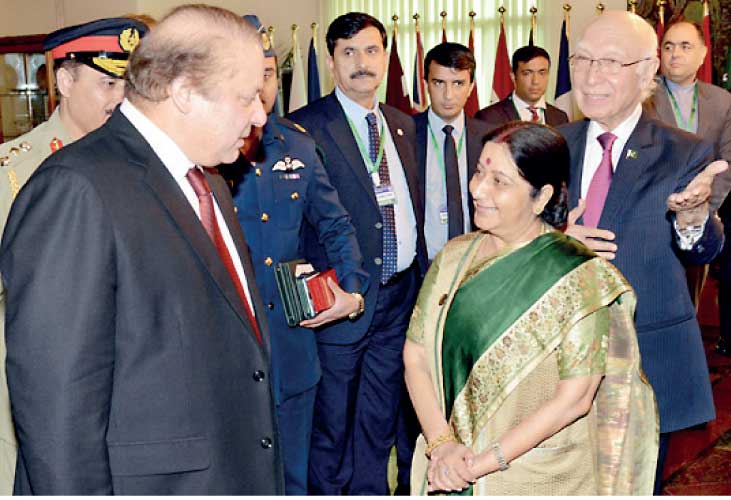Friday Feb 20, 2026
Friday Feb 20, 2026
Friday, 11 December 2015 00:00 - - {{hitsCtrl.values.hits}}

In this handout photograph released by the Pakistan Press Information Department (PID) on December 9, 2015, Pakistan’s Prime Minister Nawaz Sharif (L) speaks with Indian Foreign Minister Sushma Swaraj (2R) as Pakistan’s National Security Advisor Sartaj Aziz (R) looks on during the first day of the Heart of Asia conference in Islamabad - AFP
AFP: ISLAMABAD: India and Pakistan agreed to resume high-level peace talks on Wednesday (9 December), according to a joint statement that signalled a thaw in tense relations between the nuclear-armed neighbours, which have fought three full-scale wars.
The breakthrough came at the close of a regional conference in Islamabad attended by India’s Foreign Minister Sushma Swaraj, which also saw meetings between Afghan President Ashraf Ghani and Pakistan’s Prime Minister Nawaz Sharif in a bid to revive the Taliban peace process.
“Both the countries have agreed to resume the stalled talks,” said Swaraj, who met with Sharif and his foreign affairs adviser Sartaj Aziz, adding: “We will start the dialogue process from scratch.”
The dialogue will cover peace and security as well as territorial disputes, including over Kashmir, a Himalayan region that has seen India and Pakistan fight two wars since gaining their independence from Britain in 1947.
Delhi suspended all talks after Islamist gunmen attacked the Indian city of Mumbai in November 2008, killing 166 people. The attacks were later found to have been planned from Pakistan.
The countries agreed to resume the peace process in 2011 but tensions have spiked over the past two years, with cross-border shelling over the disputed border in Kashmir claiming dozens of lives since 2014.
A brief meeting between Sharif and his Indian counterpart Narendra Modi on the sidelines of the UN climate change summit in Paris on November 30, followed by talks between the two countries’ national security advisers in Bangkok, appeared to have broken the ice.
Pakistani opposition lawmaker Sherry Rehman, a noted foreign policy expert, said the agreement was ‘important’ but expressed disappointment that the dialogue would start from scratch – a demand she said likely came from the Indian side.
“The good news is they’ve agreed to resume what they call ‘comprehensive dialogue’ and really all the subjects are the same,” she said.
Rehman said it was unlikely the deal had been made without the approval of Pakistan’s all-powerful military, which ruled the country for around half its history and is widely seen as setting the country’s foreign and security agenda.
“I’m assuming they’ve had a discussion and come to some agreement,” said Rehman.
Neither side, however, mentioned whether a proposed cricket series in December and January would go ahead – an omission that Pakistan’s cricket chief said meant the plan was much less likely to happen.